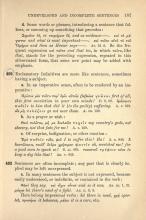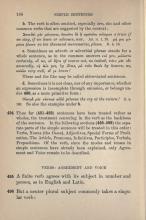490. Some expressions are not fully developed sentences, with a subject and predicate. Language begins with simpler forms, sometimes not even distinguishing parts of speech, as is clearly seen in children beginning to talk.[fn]"The language of birds is very ancient, and, like other ancient modes of speech, very elliptical; little is said, but much is meant and understood."--WHITE, Nat. Hist. of Selborne, Letter 85.[/fn] Such primitive forms remain in use, in all languages, especially in lively conversation and in poetry.[fn]Tennyson, for example, uses them very freely: "Sunset and evening star, and one clear call for me." "A plot, a plot, to ruin all!" "Gods blessing on the day!" "A week hence, a week hence." "Ah, the long delay!" "I to cry out on pride!" "Scorned, to be scorned by one that I scorn."[/fn] They are less formal, more natural for expressing emotion and simple thought. They are found in all stages of development, from the simple interjection to phrases of some length, with verbal forms, and even a subject.
491. Such are:
a. Interjections.
Ὦ, ἆ, αἰαί, φεῦ, ἰού, ἰώ
oh, ah, alas, ha, ho, etc.
b. Exclamations without a verb.
Δεῦρο.
This way! here!
μηδὲν ἄγᾱν.
Nothing too far!
ἰώ μοί μοι δύστηνος.
Ah me unhappy!
Ζεὺς σωτὴρ καὶ νῑ́κη.
Zeus the Savior and victory!
Xen. Anabasis 1.8.16
ὦ μιαρὸν ἦθος καὶ γυναικὸς ὕστερον.
O vile nature, subject to a woman!
Soph. Antigone 746
c. Titles and headings.
Κῡ́ρου Ἀνάβασις
The Expedition of Cyrus
Περὶ Ποιητικῆς
On Poetry
Ἑπτὰ ἐπὶ Θήβᾱς
Seven against Thebes
d. Some words or phrases, introducing a sentence that follows, or summing up something that precedes.
Σημεῖον δέ or τεκμήριον δέ
and as evidence—
καὶ τὸ μέγιστον
and what is most important—
καὶ τοῦτο αὐτὸ τὸ τοῦ Ὁμήρου
and then as Homer says—
Plato Apology 34d
So the frequent expression καὶ ταῦτα and that too, in which ταῦτα (like that) stands for the preceding expression, repeated in this abbreviated form, that some new point may be added with emphasis.
492. Exclamatory Infinitives are more like sentences, sometimes having a subject.
a. In an imperative sense, often to be rendered by an imperative.
Πρῶτον μὲν τοῦτο παρʼ ῡ̔μῖν αὐτοῖς βεβαίως γνῶναι.
First of all, this firm conviction in your own minds!
Demosthenes 8.39
δρᾱ́σαντι παθεῖν.
To him that did it (to the guilty) suffering.
Aesch. Libation Bearers 313
οἷς μὴ πελάζειν.
Go not near these.
Aesch. Prometheus Bound 712
b. As a prayer or wish.
Θεοὶ πολῖται, μή με δουλείᾱς τυχεῖν.
My countryʼs gods, not slavery, not that fate for me!
Aesch. Seven Against Thebes 253
c. Of surprise, indignation, or other emotion.
Ἐμὲ παθεῖν τάδε, φεῦ.
I to suffer this! Ha!
Aesch. Eumenides 837
ὦ δυστάλαινα, τοιάδʼ ἄνδρα χρήσιμον φωνεῖν.
Ah, wretched me! For a good man to speak so!
Soph. Ajax 410
τοιουτονῑ̀ τρέφειν κύνα.
To keep a dog like that!
Aristoph. Wasps 835
493. Sentences are often incomplete; any part that is clearly implied may be left unexpressed.
a. In many sentences the subject is not expressed, because easily understood, or indefinite, or contained in the verb.
Φᾱσί.
They say.
καὶ εἶχεν οὕτως.
And so it was.
Xen. Anabasis 3.1.32
μάχης δεῖ.
There's need of a fight.
Xen. Anabasis 2.3.5
Here belong impersonal verbs: δεῖ (there is need), χρή [Latin oportet], προσήκει (it behooves) μέλει (it is a care), etc.
b. The verb is often omitted, especially ἐστι, εἰσι and other common verbs that are suggested by the context.
Σπονδαὶ μὲν μένουσιν, ἀπιοῦσι δὲ ἢ προϊοῦσι πόλεμος.
A truce if we stay, if we leave or advance, war.
Xen. Anabasis 2.1.23
μή μοι μῦρίους ξένους.
No ten thousand mercenaries, please.
Demosthenes 4.19
c. Sometimes an adverb or adverbial phrase stands for a whole sentence, as in the common answers ναί (yes), μάλιστα (certainly), οὔ (no), οὐ δῆτα (of course not, no indeed), πάνυ μὲν οὖν (assuredly), νὴ Δία (yes, by Zeus), μὰ τοὺς θεούς (by heaven, no), καλῶς (very well), εὖ γε (bravo!). These and the like may be called abbreviated sentences.
d. Sometimes it is not clear, nor of any importance, whether an expression is incomplete through omission, or belongs under § 490, as a more primitive form.
Oἰκτρᾱ̀ μὲν νόστοις αὐδᾱ́.
Piteous the cry at the return!
Soph. Electra 193
494. Thus far (§§ 451 – 493) sentences have been treated rather as wholes, the treatment centering in the verb as the backbone of the sentence. In the following sections (§§ 495 – 599) the separate parts of the simple sentence will be treated in this order: Verbs, Nouns (the Cases), Adjectives, Special Forms of Predication, The Article, Pronouns, Infinitives, Participles, Verbals, Prepositions. Of the verb, since the modes and tenses in simple sentences have already been explained, only Agreement and Voice remain to be described.



